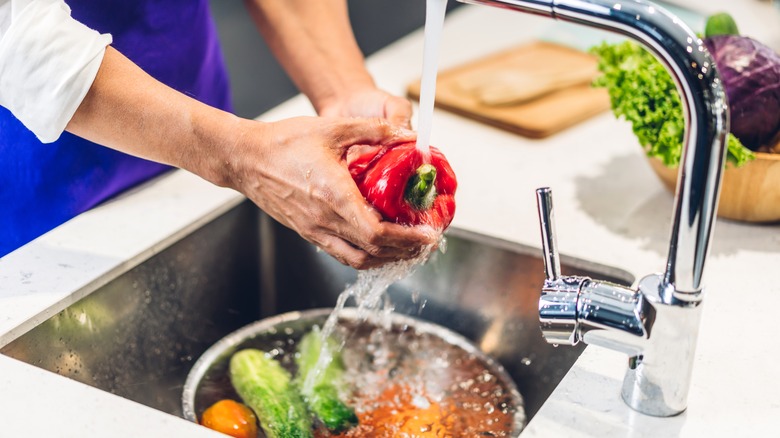Yes, You Still Need To Properly Wash Organic Produce
Boasting no added chemicals, you'd think organic produce would be a safe indicator that no pesticides or herbicides should be found on the product. Unfortunately, you'd be wrong. Even though organic produce is more likely to have fewer pathogens, it doesn't mean they're gone completely. Pesticide drift, a term used to describe pesticides flowing through the air to contaminate crops in unintended areas, is possible, as well as cross-contamination that can happen in processing facilities. And some pesticides are even approved for use on organic crops.
When it comes to organic produce, it's still best to err on the side of caution. Beyond pesticide contamination, you don't know if the organic produce picked up any extra bacterial pathogens along the way during the harvesting, shipping, and stocking process. Stop believing the myth that you don't need to wash organic fruits and vegetables, and just take that bit of extra time to wash the produce and give yourself peace of mind. Yes, even pre-washed organic produce as well!
How to effectively wash your organic produce
Let's say you've just returned home from a massive grocery haul and want to wash and prep all your produce right away so it's ready for the week. While this is a good time-saving idea, it's unfortunately not the safest choice. If you wash your produce ahead of time, that extra moisture sitting on the fruits or veggies could encourage further bacterial growth on the produce. And who's to say the produce won't pick up other microbial pathogens lurking around your kitchen or refrigerator while they wait to be used?
Just so you don't make any mistakes when washing your fruits and vegetables, it's advisable to wait to wash them until right before use. And remember, you can't clean your produce without clean hands! Properly wash and dry your hands, and then you can touch the produce and get to washing. And washing doesn't mean just a quick rinse under running water. A thorough produce wash includes washing at least three times with cold water, and lightly rubbing the produce as you go. Once they've been washed, it's important to pat them completely dry as well, using a paper towel or clean kitchen towel.
Other produce washing myths and tips
If you've picked up some fruits or vegetables with skins and peels like bananas or potatoes and think you don't need to wash them, think again! Although you may not be consuming the skins or peels, it's still important to give them a nice wash. Your hands touch the skins when you peel and chop the produce, which means you could transfer contaminants to the flesh yourself after handling. You can even reach for a scrubbing brush (reserved only for food), especially for root veggies like potatoes or carrots, to get those extra gnarly dirt spots off the surface.
While it's not necessary, some prefer to use a baking soda mixture to thoroughly wash produce. This baking soda method involves soaking the fruits or vegetables in a bowl of cold water with a few tablespoons of baking soda mixed in. If trying out this method, make sure you still give the produce a good rinse afterward, as you don't want to have any traces of baking soda remaining. While baking soda soaks or vegetable brushes can help, nothing will replace three thorough washes to remove any possible contaminants or pesticides, even from your organic produce.


